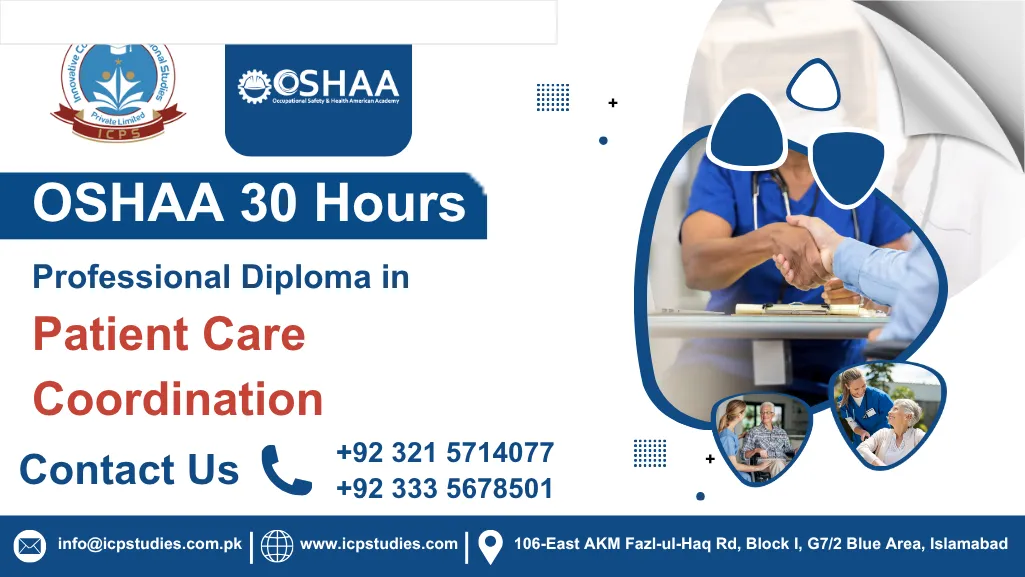Effective patient care coordination is essential for delivering high-quality healthcare services. It ensures seamless communication between healthcare providers and patients, promoting better health outcomes and patient satisfaction. The OSHAA 30-Hours Professional Diploma in Patient Care Coordination is a specialised qualification designed to equip healthcare professionals with the skills necessary to manage and coordinate patient care efficiently.
This diploma is a focused training programme that provides comprehensive knowledge and practical skills related to patient care coordination. Delivered over 30 hours, the course offers flexible learning suited to healthcare professionals, administrative staff, and coordinators working in hospitals, clinics, or community health settings.
The OSHAA 30-Hours Professional Diploma in Patient Care Coordination is a valuable credential for anyone involved in facilitating effective patient care. It equips professionals with essential skills to improve communication, streamline care delivery, and support better health outcomes. As healthcare systems evolve, this diploma ensures participants remain competent and confident in their care coordination roles.
All About OSHAA 30-Hours Professional Diploma in Patient Care Coordination
Course Overview
The OSHAA 30-Hours Professional Diploma in Patient Care Coordination is designed to equip healthcare professionals and administrative staff with the essential skills required to manage and coordinate patient care effectively. This comprehensive diploma covers key areas such as patient communication, care planning, multidisciplinary collaboration, and healthcare system navigation, ensuring seamless patient experiences and improved health outcomes.
Ideal for healthcare workers, case managers, and care coordinators, the course provides practical knowledge to enhance the delivery of coordinated care across various healthcare settings. The flexible 30-hour format allows learners to balance professional commitments while gaining valuable expertise in patient care coordination.
By completing this diploma, participants will develop the competence to streamline care processes, facilitate efficient communication between patients and healthcare teams, and ensure compliance with healthcare regulations. This qualification supports career growth and positions learners to contribute meaningfully to the evolving healthcare landscape.
Study Units
- Introduction to Patient Care Coordination and Healthcare Systems (3 hours)
- Roles and Responsibilities of a Care Coordinator (3 hours)
- Effective Communication with Patients, Families, and Health Professionals (4 hours)
- Understanding Patient Pathways and Continuity of Care (3 hours)
- Managing Appointments, Referrals, and Follow-Ups (3 hours)
- Navigating Electronic Health Records and Healthcare Technology (3 hours)
- Legal, Ethical, and Confidentiality Principles in Care Coordination (5 hours)
- Coordinating Care Across Multiple Services and Providers (3 hours)
- Supporting Patients with Complex or Chronic Conditions (3 hours)
Minimum Age
Candidates must be at least 18 years old to enrol in this diploma course, ensuring the necessary maturity for professional healthcare training.
Educational Background
A minimum of secondary education (equivalent to GCSEs or Level 2 qualifications) is recommended. Prior experience or qualifications in healthcare or related fields are advantageous but not mandatory.
Work Experience
While previous experience in healthcare, patient care, or administrative roles is beneficial, it is not essential. The course is suitable for both newcomers to patient care coordination and existing professionals seeking to enhance their skills.
Language Proficiency
Proficiency in English is required as the course content, assessments, and communication are conducted in English. Candidates should be able to comprehend technical information and communicate effectively in both written and spoken English.
Healthcare professionals seeking to improve their patient care coordination skills
Administrative staff involved in patient management and scheduling
Care coordinators and case managers working across healthcare settings
Individuals aspiring to begin a career in patient care coordination
Organisations aiming to enhance the efficiency of their patient care processes
Support staff looking to understand healthcare systems and improve communication
Professionals involved in multidisciplinary healthcare teams
Learning Outcomes
Introduction to Patient Care Coordination and Healthcare Systems
- Understand the fundamentals of patient care coordination
- Gain insight into the structure and function of healthcare systems
- Recognise the importance of coordinated care in improving patient outcomes
Roles and Responsibilities of a Care Coordinator
- Identify the key duties and responsibilities of a care coordinator
- Understand the role in facilitating communication and care planning
- Develop awareness of the skills required for effective care coordination
Effective Communication with Patients, Families, and Health Professionals
- Learn techniques for clear and empathetic communication
- Understand how to engage with patients and their families sensitively
- Develop skills to collaborate effectively with healthcare professionals
Understanding Patient Pathways and Continuity of Care
- Understand the concept of patient pathways in healthcare delivery
- Recognise the importance of maintaining continuity of care
- Learn to manage transitions between different care settings smoothly
Managing Appointments, Referrals, and Follow-Ups
- Acquire skills to organise and manage patient appointments efficiently
- Understand the referral process and its significance in care coordination
- Learn to monitor and follow up on patient care to ensure effective outcomes
Navigating Electronic Health Records and Healthcare Technology
- Gain proficiency in using electronic health records (EHR) systems
- Understand the role of healthcare technology in patient care coordination
- Learn best practices for data entry, retrieval, and confidentiality
Legal, Ethical, and Confidentiality Principles in Care Coordination
- Understand key legal and ethical principles governing patient care
- Recognise the importance of patient confidentiality and data protection
- Learn to apply these principles in daily care coordination activities
Coordinating Care Across Multiple Services and Providers
- Develop skills to manage care involving multiple healthcare providers
- Learn to facilitate communication and collaboration across services
- Understand how to address challenges in multi-provider care coordination
Supporting Patients with Complex or Chronic Conditions
- Recognise the unique needs of patients with complex or chronic illnesses
- Develop strategies to provide tailored support and care planning
- Learn to coordinate multidisciplinary approaches to improve patient wellbeing
FAQs OSHAA 30-Hours Professional Diploma in Patient Care Coordination







